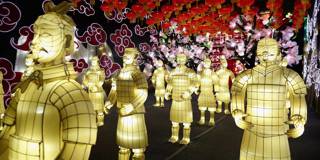As machine-learning algorithms come to dominate decision-making in business, politics, and society, the pressure to make more personal data available will steadily increase, and privacy protections will be eroded. If we do not take the reins of these new technologies, they could lead us toward a political system we did not choose.
WASHINGTON, DC – Around 1200 BC, the Shang Dynasty in China developed a factory system to build thousands of huge bronze vessels for use in everyday life and ritual ceremonies. In this early example of mass production, the process of bronze casting required intricate planning and the coordination of large groups of workers, each performing a separate task in precisely the right order.
A similarly complex process went into fashioning the famous army of terracotta warriors that Qin Shi Huang, China’s first emperor, unveiled one thousand years later. According to the Asian Art Museum in San Francisco, the statues “were created using an assembly production system that paved the way for advances in mass production and commerce.”
Some scholars have speculated that these early forms of prescriptive-work technologies played a large role in shaping Chinese society. Among other things, they seem to have predisposed people to accept bureaucratic structures, a social philosophy emphasizing hierarchy, and a belief that there is a single right way of doing things.

WASHINGTON, DC – Around 1200 BC, the Shang Dynasty in China developed a factory system to build thousands of huge bronze vessels for use in everyday life and ritual ceremonies. In this early example of mass production, the process of bronze casting required intricate planning and the coordination of large groups of workers, each performing a separate task in precisely the right order.
A similarly complex process went into fashioning the famous army of terracotta warriors that Qin Shi Huang, China’s first emperor, unveiled one thousand years later. According to the Asian Art Museum in San Francisco, the statues “were created using an assembly production system that paved the way for advances in mass production and commerce.”
Some scholars have speculated that these early forms of prescriptive-work technologies played a large role in shaping Chinese society. Among other things, they seem to have predisposed people to accept bureaucratic structures, a social philosophy emphasizing hierarchy, and a belief that there is a single right way of doing things.